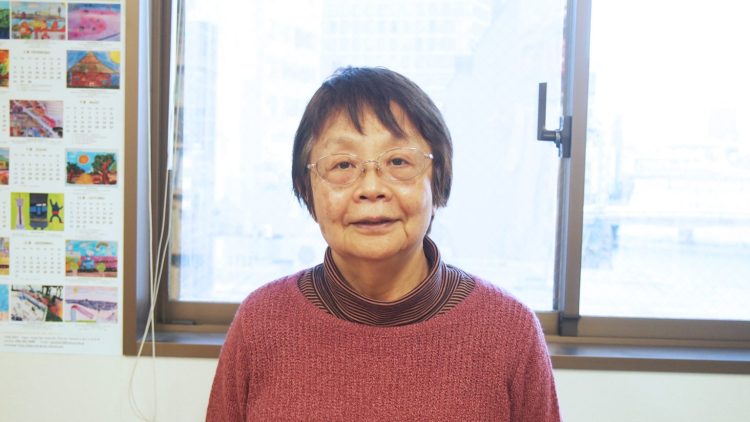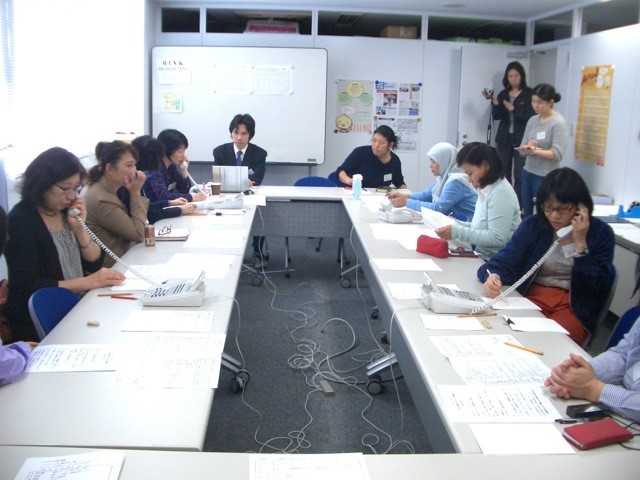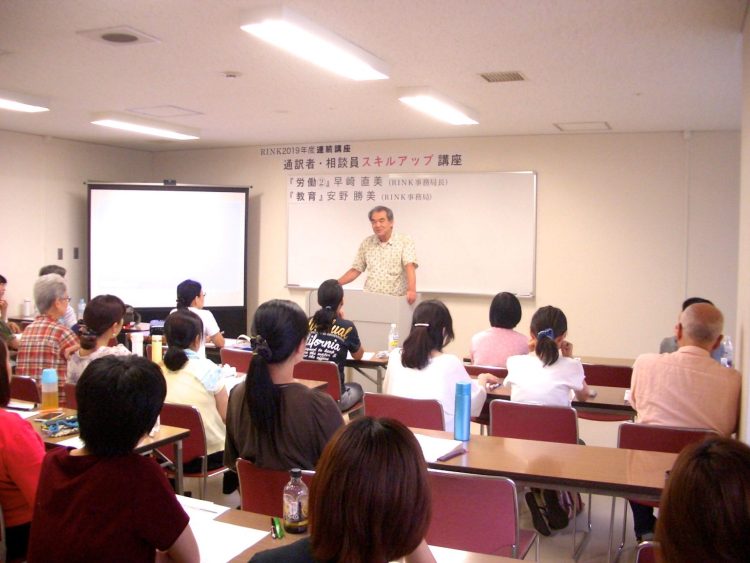Supporting Foreign Residents in Japan: An NPO protecting human rights through multilingual consultation services InsightsEssays: Civil Society in Japan
Posted on August 14, 2023
Japan NPO Center (JNPOC) has a news & commentary site called NPO CROSS that discusses the role of NPOs/NGOs and civil society as well as social issues in Japan and abroad. We post articles contributed by various stakeholders, including NPOs, foundations, corporations, and volunteer writers.
For this JNPOC’s English site, we select some translated articles from NPO CROSS to introduce to our English-speaking readers.
Supporting Foreign Residents in Japan: An NPO protecting human rights through multilingual consultation services
“Being a foreigner means you could always be treated with suspicion and not listened to thoroughly. If you are treated like that, anyone would feel hurt, wouldn’t they?” says Ms. Naomi Hayasaki, Executive Director of RINK: Rights of Immigrants Network in Kansai.
She is not referring to prejudiced individuals. Rather, it is about what people encounter when they are dealing with government agencies in Japan. Some readers may think that cannot be the case, that the government would surely treat people well. However, there are, in fact, foreigners in Japan who feel discriminated against and isolated in this foreign land.

Ms. Naomi Hayasaki, Executive Director of RINK
Mindset unchanged as trust builds
“We have been working with the same members for more than 30 years.”
RINK was established in December 1991 to help foreign residents in Japan who were having difficulties in their lives. The five-member team, including Ms. Hayasaki who serves as the executive director, provides multilingual consultations over the phone and online. Interpreters are sometimes present during consultation services, with more than 20 interpreters currently registered. Accompanying support is also provided, with RINK staff and interpreters visiting immigration offices, labor standards bureaus, and other government agency offices with the foreign residents as needed.

Once or twice a year, RINK cooperates with the Telephone Consulting for Foreign Workers, organized by JTUC (Japanese Trade Union Confederation)-RENGO Osaka. [Photo courtesy of RINK]
According to Ms. Hayasaki, the number of cases where RINK provides accompanying support has gradually increased over the years, to about 250 cases per year now. In all of Japan, there were 2,961,969 foreign residents as of June 2022, more than doubling the population compared to when RINK was founded 31 years ago when their population was only about 1.21 million. It is understandable that the number of foreign residents requesting assistance has also increased during this time.
Regular consultation activities are conducted mainly on weekdays. Different days of the week are allotted to different foreign languages spoken by RINK members, with Ms. Hayasaki in charge of Wednesdays in Chinese. One RINK member comes to the office in Osaka City each weekday to answer phone calls. When asked what is important to the members of RINK, Ms. Hayasaki replied, “We value putting ourselves in the shoes of those who consult with us. I think we all have the same mindset.”
And this mindset has remained unchanged ever since RINK’s founding.
Reasons why foreign residents experience difficulties
”I am forced to work overtime without pay.” “The employer suddenly fired me.” “I am experiencing domestic violence at home.”
These are the issues with which people come to RINK for consultations. The same problems can occur to Japanese people as well, but one difference between foreign and Japanese residents is the difficulty in finding the right place to consult. Specifically, foreign residents struggle when gathering information due to language and other barriers, and they also face inadequacies in the system. They must jump through many hoops before finding an appropriate place where they can take their issues.
For instance, when you rely on your local government, you may find out that the person dealing with you at the counter could become overly cautious and hesitant the moment they find out you are a foreigner. Even if you consult with the embassy of your own country, they seldom support an individual to such an extent as to serve as a go-between for you and a Japanese government agency. Somebody who came to RINK has said that when they rushed to their own embassy, they were told to “be patient and return” to the difficult circumstances. People, who were at wit’s end with their life in Japan, turn to those they thought would offer help, but, in the end, their concerns were not taken up. To whom, then, should such people turn?
Ms. Hayasaki prefaces her answer with the acknowledgment that “the government has its own positions and circumstances,” but continues to offer her take: “If we think that a Japanese person going to the government would not receive the same treatment, then we stand completely with the foreign resident asking us for help. We believe it is discrimination when you treat somebody differently just because this person is a foreigner. That is a non-negotiable stance for us.”
Thinking from the perspective of the person in need
Ms. Hayasaki says that in employment-related cases, if the employer and the foreign employee have different opinions, government cannot step in between the two. For this reason, she says, there are cases in which the government actually refers the employee to RINK. In one such case, RINk was able to have a labor union get involved and the foreign employee be a part of the union’s collective bargaining process.
But can we say that the claims the foreign residents are making are always 100% correct?
“Well, sometimes, what they are telling us is not the truth. Sometimes, things just don’t work out… Still, we must try to understand the reasons why this person said what they said. We have to figure out why something happened the way it happened.”
Listening carefully to those who come to RINK for consultations, Ms. Hayasaki realized that, more often than not, people thought they were not taken seriously by government agencies because they were foreigners. Even in cases where the officials were actually giving them correct information, some foreign residents erroneously assumed they were being rejected based on the facial expressions or the tone of voice of these officials.
“People are sensitive to such attitudes. We understand how they feel, so we thoroughly listen to what they have to say and explain to them as accurately as we can. In the end, people understand. When even those who had no choice but to return to their home countries tell us, ‘I’m glad I consulted with RINK,’ I feel the significance of our activities,” says Ms. Hayasaki.

RINK regularly offers courses for interpreters and counselors so that they can acquire the knowledge necessary to support foreign residents. [Photo courtesy of RINK]
“We’re glad we connected with RINK.”
When you listen to people intimately, sometimes it is not possible to respond to their needs just by answering phone calls in their office. In some cases, RINK members give their personal mobile phone numbers to the people who call for help. If you start receiving calls on your private number, then wouldn’t this become a 24-hour service?
“Well, yes… I’ve even had people call me in the middle of the night,” Ms. Hayasaki said, and she told us about something that happened in the past.
This was a case in which the employer did not pay wages and the case eventually went to court. The foreign residents who asked for help were three female technical intern trainees living in Aomori Prefecture. The women worked in the factory from morning until late in the evening, so it was close to midnight when they would call her. Through these phone calls, she found out the oppressive working hours and precarious living conditions.
“They lived in a prefabricated hut set up in the company’s parking lot. Despite the harsh winters in Aomori, the walls were thin and the temperature inside the hut was almost the same as outside. There were only beds in the hut, so no shower, kitchen, or toilet. They had to go inside the factory for those things,” she said.
The women lived there for about three years. When they told her, “We are not treated as human beings by the company and we can’t take it any longer,” Ms. Hayasaki’s response was to go to Aomori to meet with the women in person. And it was not just once. It was a surprise hearing how she paid for her own transportation during her several trips there.
“After talking to them several times, I knew they trusted RINK, and I of course felt, ‘I’m the only one who can do this!’” Ms. Hayasaki let out a laugh. “In Aomori, we went to a family restaurant that was open 24 hours and talked there,” she said with a smile on her face, a sign that she had no doubts about what she had to do, from the very beginning.
In the end, the women settled with the employer and received payment for their unpaid wages. The three trainees chose to return to their home countries instead of continuing as technical interns in Japan. The last words they left Ms. Hayasaki were, “We’re glad we connected with RINK.”
The roles they can play because they’re a civic organization
“I realized that there are actually kind people in Japan.” Ms. Hayasaki says she would hear people say that in the course of RINK’s work. Indeed, many technical intern trainees feel that the only place they belong to in Japan is their company, while within the confining relationships at their company, some may experience intimidation and overbearing attitudes among the company president and employees, while others are subjected to words that denigrate their character. Ms. Hayasaki says, “If the only Japan they know is their company, then it must be very difficult for them.”
More than 30 years have passed since RINK began to listen to the voices of foreign residents who tell them, “It’s tough,” “Things are painful for me,” and “I can’t stand it anymore.” For RINK, which has been active for such a long time, what is their raison d’etre?
“We believe civic organizations are the only ones who can act from the standpoint of the people in need. Government agencies have to be neutral, given what they are, you know? In that sense, I don’t think the need for RINK will ever disappear. No matter how well the system is set up, there will inevitably be people who will fall through the cracks.”
And this is why RINK will continue to stand next to and walk with foreign residents in need.
About RINK: All members of RINK are volunteers, and the transportation costs for accompanying and supporting foreign residents and the honorarium for interpreters are covered by membership fees and donations. For more information on becoming a RINK member or donating to them, click here.
Original text by Erika Schneider (JNPOC’s volunteer writer) originally posted on March 1, 2023; translated by JNPOC. Ms. Schneider interviewed Ms. Naomi Hayasaki, the Executive Director of RINK.
Recent Articles
- Shared solutions, stronger communities: Social economy and social innovation in Europe and Japan
- NPO support for disaster victims: Key discussion points
- Beyond support: Fostering genuine dialogues
- Reconsidering the significance of public comments
- Towards a society where children want to embrace life
- The Evolution of Philanthropy: Five approaches shaping contemporary practice